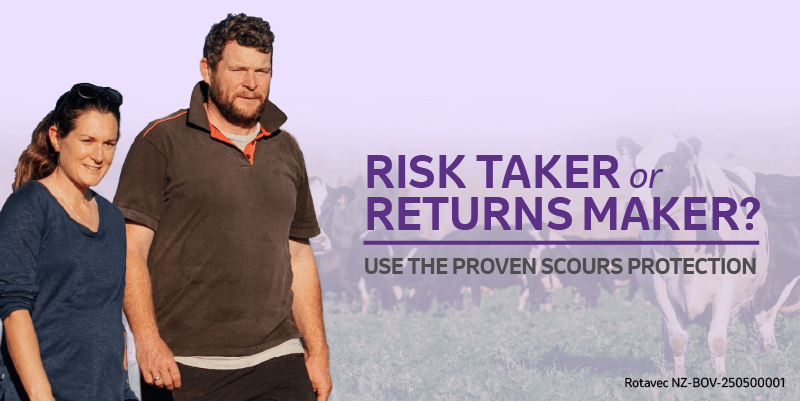

Fletchers back Rotavec Corona
As an experienced veterinarian, it was demoralising for Mara Elton Fletcher to watch a severe rotavirus scours outbreak unfold on her own dairy farm.
Mara and her husband, Hayden, milk 930 cows in Culverden, North Canterbury, and despite having top-quality colostrum management and hygiene practices in place, their herd was hit hard with a rotavirus outbreak, prompting them to vaccinate the entire herd last year with Rotavec Corona.
“It was a breaking point for myself as a veterinarian, seeing so many sick animals,” Mara explains. “The decision to preventatively vaccinate going forward was a very easy decision for Hayden, who manages the farm, to make. Having experienced the stress, anxiety, and demoralisation of a full-blown rotavirus scours outbreak, vaccination was a logical next step.”
The common and highly infectious disease was not only damaging the health and potential future growth of their calves but was also taking a serious mental toll on the couple and their staff.
“Experiencing a large scours outbreak was extremely stressful and involved very long hours to treat all of the sick calves and prevent the healthy ones from getting it. The farm staff were having to come off their routine jobs and help our calf rearers… there’s nothing worse than seeing all your staff exhausted and at their wits end.”
Hayden adds the tight labour market post-COVID meant it was really important to get rotavirus under control. “There were no backpackers or casual staff available, and we just didn’t have the manpower to deal with anything like that happening again. So we wanted to remove that risk,” he explains.
“We calve 80 percent of our cows in three weeks so it all happens really fast. It’s all on a knife’s edge as it is, so if you have a rotavirus outbreak, everything can just spiral out of control.”
The couple chose to vaccinate with Rotavec Corona because it was a single shot treatment that had been scientifically proven in the field and peer-reviewed.
The vaccination works by transferring antibodies into the colostrum. It must be administered 3-12 weeks before calving begins which Hayden admits is a tricky time of year when cows are wintering off-farm and farmers themselves are trying to take a breather. But Mara says the risk of not giving the vaccine has far greater consequences.
Mara says rotavirus has had an obvious impact on calves who contracted it in terms of growth rates, and their ability to maintain a high immune status as a young growing animal. Post-vaccination, the couple believe their scours free calves are heavier on average than the year before going into their first winter.
“If they don’t get sick when they’re young, their energy is going into growth the whole time and not fighting disease,” Mara says. “We definitely had less sick calves, in general, this year.” She warns farmers not to be complacent about rotavirus or accept it as a fact of rural life.
“Top quality colostrum management and hygiene alone isn’t going to prevent scours. It’s not going to prevent rotavirus. It might reduce the mortality rates, but it’s not going to prevent the disease. You do everything you can to try and minimise the spread, but it’s always going to spread. It’s as infectious as Omicron or more,” she says. “With a scours vaccine such as Rotavec on board, you can reduce the risk of rotavirus, coronavirus and E.coli.”
Having a well-grown, high producing animal that produces high quality food is the ultimate goal and the couple says there’s “not a chance” they would go through calving again without having first vaccinated all cows and heifers with Rotavec Corona.
“Every season’s different, but I don’t think there’s any question whether or not we’re going to be vaccinating the herd again,” Mara says. “And that’s because we know that it works. Rotavec Corona is now an integral part of our system together with good colostrum quality and hygiene management. Combined this gives us the best chances of preventing rotavirus.”
For more information about vaccinating your cows and heifers with Rotavec Corona before your calving season begins, speak to your veterinarian today.

